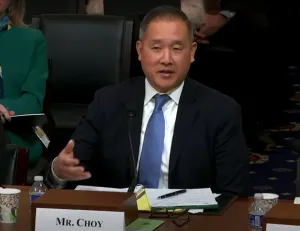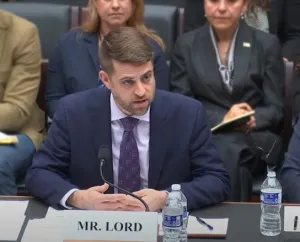CBP Access is an electronic news page developed by the Office of Congressional Affairs for Members of Congress and staff. If you are interested in subscribing to the CBP Access email distribution list, please send an email to OCAInquiry@cbp.dhs.gov.
In this Update
Message from the Deputy Assistant Commissioner
CBP’s mission to protect U.S. borders and facilitate legitimate trade and travel is not only essential to national security but also a key driver of the nation’s economic prosperity. Despite several disruptions to global trade markets caused by ongoing political conflicts and the lingering effects of the COVID-19 pandemic on supply chains, CBP continues to observe an increase in trade volume, particularly in the e-commerce and low value shipment environment. CBP remains vigilant of the threat of criminal networks and bad actors attempting to take advantage of the complexity of global supply chains to hide illicit activity, including forced labor, intellectual property violations, and the shipment of illicit drugs like fentanyl. This CBP Access update highlights just some of the strategies and programs that CBP has implemented to strengthen its enforcement posture and improve the facilitation of lawful and essential trade.
–Stephanie Talton, Deputy Assistant Commissioner, Office of Congressional Affairs
Combatting Forced Labor in U.S. Supply Chains
CBP’s forced labor enforcement mission supports ethical and humane trade practices while leveling the playing field for U.S. industries. CBP is the only U.S. government agency, and one of the few in the world, with the legal authority to take enforcement action against goods produced with forced labor to prevent entry into domestic commerce.
On January 11, 2024, Eric Choy, Executive Director for the Trade Remedy Law Enforcement Directorate within CBP’s Office of Trade, testified before the House Committee on Homeland Security’s Subcommittee on Oversight, Investigation, and Accountability about CBP’s enforcement of forced labor laws, focusing on the Uyghur Forced Labor Prevention Act (UFLPA) and Section 307 of the Tariff Act of 1930. Executive Director Choy emphasized CBP’s commitment to eliminating forced labor from U.S. supply chains, detailing the agency’s collaboration with government and industry partners and its use of a sophisticated, risk-based approach to identify and detain shipments made with forced labor. The UFLPA charges CBP with enforcement of a rebuttable presumption that importation of goods mined, produced, or manufactured wholly or in part in Xinjiang, or produced by entities identified in the UFLPA Entity List are not entitled to entry to the United States.
The U.S. Department of Homeland Security (DHS) recently added 29 Chinese companies to the UFLPA Entity List. This move is part of a broader effort to prevent goods made with forced labor from entering the U.S. market, focusing on the textile, seafood, aluminum, and footwear industries in the Xinjiang region. According to the May 17, 2024, and June 12, 2024, announcements, the listed entities’ products will be presumed to be produced with forced labor and prohibited from U.S. entry unless proven otherwise. This addition brings the total number of entities on the UFLPA list to 68, reflecting an ongoing commitment to eradicate forced labor from U.S. supply chains and increase transparency about forced labor in various sectors.
CBP supports industry compliance with forced labor laws through guidance and technology, while addressing challenges presented by the expanding small shipment environment. CBP encourages the public to report suspicions of forced labor via the e-Allegation system and encourages stakeholders in the trade community to closely examine their supply chains to ensure goods imported into the United States are not linked to forced labor practices.
Protecting Intellectual Property Rights
Trade in counterfeit and pirated goods threatens America’s innovation economy, the competitiveness of U.S. businesses, the livelihoods of U.S. workers, and, in some cases, national security and the health and safety of consumers. Trade in these illegitimate goods is associated with smuggling and other criminal activities, and often funds criminal enterprises. CBP protects the intellectual property rights (IPR) of American businesses, safeguarding them from unfair competition. CBP targets and seizes imports of counterfeit and pirated goods and enforces exclusion orders on patent-infringing and other IPR violative goods.
Brandon Lord, Executive Director of Trade Policy and Programs within CBP’s Office of Trade, testified on May 7, 2024, before the U.S. House Judiciary Subcommittee on Courts, Intellectual Property, and the Internet on CBP’s enforcement of IPR. During the hearing, Executive Director Lord emphasized the importance of IPR enforcement to protect America’s innovation economy, national security, and consumer safety. He also detailed CBP’s multifaceted strategy to deter, detect, and enforce against counterfeit goods, highlighting the significant increase in IPR seizures, particularly from China and Hong Kong.
Similar to Executive Director Choy’s testimony on forced labor, Executive Director Lord also discussed the challenges posed by the rise of e-commerce and low value “de minimis” shipments, which have complicated CBP’s enforcement efforts. He also underscored the role of public-private partnerships and the use of advanced technologies and intelligence to strengthen enforcement. CBP recently announced a new partnership with Canon U.S.A., Inc., to help prevent counterfeit products from entering the United States. Under this new partnership, which is part of CBP’s Donations Acceptance Program, Canon will donate 328 verification tools to CBP cargo and mail facilities to aid in authenticating a variety of Canon merchandise. Additionally, Executive Director Lord highlighted CBP’s collaboration with various agencies and international partners to bolster global IPR enforcement and consumer education campaigns aimed at reducing the purchase of counterfeit goods.
IPR violations continue to put America’s innovation economy at risk. Suspected IPR violations, fraud or illegal trade activity can be reported by contacting CBP through the e-Allegations Online Trade Violation Reporting System or by calling 1-800-BE-ALERT. Violations can also be reported to the National Intellectual Property Rights Coordination Center.
Enforcing Trade Laws in the Small Package Environment
E-commerce revolutionized the way goods are bought and sold, and CBP continues to see record volumes of small, low-value shipments arriving in the United States. In FY 2023, CBP processed more than 1 billion shipments under the de minimis value exemption threshold. Because low value shipments pose the same health, safety, and economic security risks as containerized shipments, CBP has taken numerous steps to address multiple enforcement challenges in this growing trade environment.
In 2019, CBP implemented two initiatives – the Section 321 Data Pilot and the Entry Type 86 test – focused on data collection and identification of high-risk shipments while expediting legitimate trade. Informed by the outcome of these initiatives, CBP is updating regulations to require additional information regarding shipments claiming eligibility for the de minimis administrative exemption and to clarify existing processes. CBP is also working closely with Congress to pursue critical statutory changes to further enhance efforts to interdict dangerous and illicit goods in the small shipment environment.
Furthermore, CBP Acting Commissioner Troy Miller recently announced new efforts to enhance trade enforcement and prevent exploitation of the expanding small package environment by suspending noncompliant participants in the Entry Type 86 Test until corrective actions are completed.
CBP’s robust trade enforcement programs protect American consumers, businesses, and the nation’s economic security by keeping dangerous goods from entering the United States and ensuring compliance with U.S. trade laws and regulations.
Enforcement News from Across CBP
CBP Issues Withhold Release Order for Goods Produced with Convict Labor
Washington, DC — CBP recently directed personnel at all U.S. ports of entry (POE) to detain work gloves manufactured by Shanghai Select Safety Products Company, Ltd., and its two subsidiaries based on information that reasonably indicates the use of convict labor in violation of 19 U.S.C. § 1307 in the production of that merchandise. This law prohibits the importation of all goods mined, produced, or manufactured wholly or in part in any foreign country by convict labor or/and forced labor, or/and indentured labor under penal sanctions, which includes forced or indentured child labor. When CBP has information reasonably indicating that imported goods are made by forced labor, the agency will order POE personnel to detain shipments of those goods. Such shipments will be excluded or subjected to seizure and forfeiture if the importer fails to demonstrate proof of admissibility in accordance with applicable regulations.
CBP Seizes Pill Manufacturing Equipment from China
Chicago, IL – Several shipments containing instruments drug traffickers use to manufacture illicit drugs were recently seized by CBP officers in Chicago. Several shipments contained pill press die sets, while another package concealed an entire pill press machine. Drug traffickers can use this equipment to create several narcotics, most commonly fentanyl, methamphetamine, heroin, or other synthetic opioids. The shipments, which all arrived from China, were addressed to five separate residences throughout the United States. All the shipments were seized for unlawful importation of drug paraphernalia.
CBP Intercepts Counterfeit Designer Clothing and Accessories
Rochester, NY — CBP officers at the Rochester POE recently seized numerous designer products for bearing counterfeit trademarks, including multiple high-priced watches. CBP officers inspected several shipments that contained multiple pieces of designer clothing, shoes, handbags, and watches. After a thorough examination of the merchandise, all the items were determined to be inauthentic and were seized for bearing counterfeit trademarks. Had these items been genuine, the total Manufacturer Suggested Retail Price (MSRP) value of the shipments would have been approximately $1.6 million.








